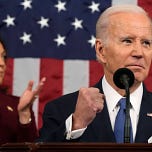In President Joe Biden's recent State of the Union address, viewers were not just treated to a traditional policy rundown; they were offered a vivid contrast between two visions of America.
This contrast was most vividly drawn through Biden's fiery and partisan rhetoric, distinguishing his presidency as one rooted in democracy, in stark opposition to the authoritarian leanings personified by "his predecessor," who he referred to about a dozen times but never mentioned by name. It was less a policy speech and more a call to the soul of America, framed around the stark dichotomy between a leader who upholds democracy and another who seemingly undermines it.
With his speech bookended by warnings about the state of democracy, at home and abroad, Biden framed his entire discourse within the broader narrative of democracy’s endurance, placing it on the ballot this November.
Through his vigorous critiques of Trump's foreign policy missteps, including the controversial stance on NATO and Russia, Biden aimed to present himself as a guardian of democratic principles, both domestically and internationally.
Echoing the urgency of Franklin D. Roosevelt's wartime speeches, Biden made it clear that history's eyes are upon us, urging Congress to stand firm against Russia and critiquing Trump for his unsettling deference towards Vladimir Putin. The speech sought to paint Trump not as a world leader but as a supplicant, tying domestic strife directly to global democratic challenges.
Biden sought to present a foreign policy that marries moral leadership with strategic interests. Forget about Biden’s plea to "stand with Ukraine;" Republicans refused to applaud the notion that Putin should not be allowed to invade his neighbor with impunity and failed even to muster applause for the defense of democracy. It shows the debate over Ukraine aid underscores a deeper struggle for the heart of American foreign policy.
The president’s narrative isn't merely a political strategy; it's a reflection of the broader ideological struggle defining our times. As Biden juxtaposes his vision of an America that stands as a beacon of democracy against Trump's more inward-looking, nationalist approach, the forthcoming election emerges as not just a contest for political power but a referendum on the values that will shape America's future and its role in the world.
But there are inherent tensions in his approach and the political ramifications of his policies on Israel and Ukraine. His balancing act on Gaza sought to navigate the complex political terrain at home. By announcing plans to build a port to deliver aid to Gaza, offering reassurance to progressives and younger Americans within his party concerned about his unconditional support for Israel that could dampen voter turnout in the fall elections, while supporting Israeli hostages and cautioning Prime Minister Benjamin Netanyahu against weaponizing humanitarian aid.
"Humanitarian assistance cannot be a secondary consideration or a bargaining chip," Biden declared, marking perhaps his most forceful language yet on the conflict. “Protecting and saving innocent lives has to be a priority."
Biden's foreign policy discussion, especially his commitment to Ukraine amidst Russian aggression, served as a stark contrast to a potential foreign policy under Trump. The president emphasized, “Now assistance to Ukraine is being blocked by those who want to walk away from our world leadership,” invoking former President Ronald Reagan to underscore the ideological battle at play.
His frustration was palpable as he criticized those obstructing aid, marking a clear distinction from Trump, who once suggested NATO allies were on their own against Russian might, which he called “outrageous. It's dangerous and it's unacceptable.”
Those comments illustrate how the Ukraine conflict has become a litmus test for American foreign policy and the commitment of the U.S. to its allies. It’s a framing that not only seeks to rally support among his base but also aims to draw a clear line in the sand, challenging voters to consider the broader implications of their choice come election day.











Some thoughts on foreign policy in Biden's SOTU